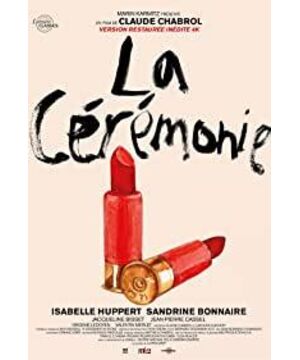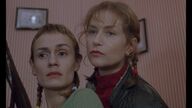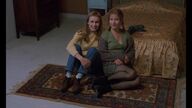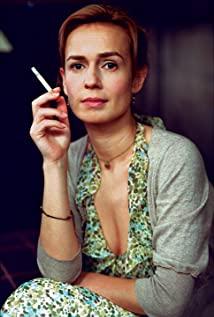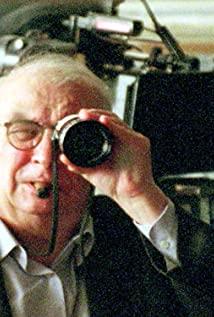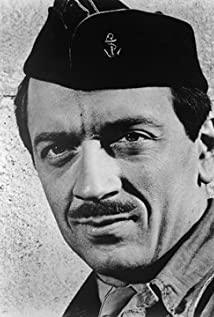At this year's Cannes Film Festival Awards Ceremony, Feng Junhao held Palme d'Or and said two French directors he would like to thank: Henry-George Cruzo and Claude Chabrol.
Compared to Cruzo, who is known for making thrilling and suspenseful movies, Chabrol seems to be less well known. Although he is recognized as a member of the new wave of French cinema, he has long been obscured by the aura of Godard, Truffaut and Rohmer. And this time Feng Junhao mentioned Chabrol to a large extent because of his 1995 film "Cold Festival", which can almost be regarded as the mother of "Parasite". They have very similar themes and structure settings, but before "Parasite" won the award, no one mentioned this thriller with naturalistic mental impulse for a long time.
1
In our usual perception, Hollywood films and European films can be distinguished by "commercial" and "art". However, when it comes to American filmmakers like John Ford, Howard Hawks, and Nicholas Ray who are both Hollywood directors and authors, it seems difficult to simply describe their relationship with "business" and "art". The difference between European counterparts.
In this regard, European film theorists such as French film critic Jean Douchet or philosopher Gilles Gilles put forward another more in-depth view: They think that American cinema is a typical "action film". In fact, it inherits the traditions of ancient Greek tragedies and Shakespeare, making the characters’ psychological activities closely linked to their external behaviors, and any character’s actions or conflicts and contradictions between characters can be found on the inner level of the characters. Root motivation. As a result, American films developed into a type of film with obvious causal relationships that developed linearly. European films started with Italian neo-realism, deliberately cutting off the inevitable connection between the character’s spirit and action. The character wandered in the city for no reason, or stayed in a state of separation between spiritual activity and actual action—— The desire, sensibility, and perception of the human heart are only kept in an abstract state, and are not transformed into actions at all, or suddenly transformed into irrelevant actions that are completely disproportionate to the motivational psychology or even difficult to explain by causality.
Deleuze even gave the latter kind of film a term: "impulse-image". It focuses on portraying the impulsive psychology inspired by the unpredictable desire instinct in the character. The "action" that is emphasized in the usual movies, in which the desire that is completely reduced to a critical state, is even an auxiliary portrayal method for the throbbing of the animal instinct. It is through this definition that there is a clear boundary between contemporary American cinema and European cinema.
In Deleuze’s "Cinema Dictionary", German directors in the 1920s were like Erich von Strauchen, Spanish director Luis Buñuel in the 1950s, and from the 1960s onwards The American director Joseph Rossi who lives in the UK to shoot movies is the "spokesperson" of impulse-images. And when we look at "The Cold Ritual" from this perspective, we will find that this is also a typical film driven by complex impulses that cannot be suppressed in the characters' hearts.
2
"The Ruthless Ceremony" tells the story of the maid Sophie applying for a job in a middle-class family living in a country house. She tried to conceal the fact that she was an illiterate who didn't know a word, but gradually couldn't cope with the various daily communication requirements of the host Lelevre's family of four unintentionally: shopping according to the notes, looking for documents, and even answering the magazines. Game quiz and so on.
Sophie regarded the illiteracy defect as an extremely secret personal privacy, and regarded its exposure as her own shame. Faced with the escalating pressure of exposure, she fell into a hostile mood mixed with anxiety and anger. Driven by Jeanna, a post office clerk who was also hostile to Le Levre’s family, the two of them started a series of provocative and extraordinary actions in the small town, and finally took a shotgun in the middle of the night in an abrupt manner. Bloodbath the villa.
In the middle of the film, Chabrol revealed to the audience through a news briefing that Sophie was the suspect who killed her father by arson, in order to imply a potential connection between her and the violence. However, during most of the film's time, we have never seen such a violent factor transformed into any actual action. On the contrary, what is presented to us is Sophie's gradual tension under pressure and the tension that cannot be released after climbing to the top: after receiving the first note left by the owner, she tried to pass contrast sign language The pronunciation recognition textbook understood the content of the note, but finally failed and became extremely anxious. Faced with the shopping list left by the hostess, she was nervously at a loss and had to walk a few kilometers to the town’s post office to ask for help. After getting to the host's phone and asking her to search for a document, she suddenly hung up and returned to the room, staring at the TV blankly and intently, as if any effort to bring her back to reality and face the problem would provoke her attack.
We can experience Sophie's depressive tension and decisive cold expression when facing a secret revealed, and experience the violent factor hidden in Sophie's body that gradually escalates to the critical point of the outbreak. Although the Le Levre family is friendly on the surface, they push Sophie to the psychological opposite in various ways from time to time: the hostess George and Catherine often talk about Sophie’s privacy without hesitation, and occupy her with extra work. During the break time, her daughter Melinda "imposed" Sufi's help in a typical middle-class benefactor attitude, and all this was accompanied by the danger of Sufi's secret being revealed at any time, so hostile and even destructive emotions Spread across all corners of this villa.
What's interesting is that whenever Sophie is on the verge of losing her dignity, she will return to her room to turn on the TV, and immediately sink into another virtual and noisy world outlined by the TV program. It is in this world that does not need to read but only hears, all her inner depression, tension, resentment and even desires are released and satisfied to a certain extent. This is another structure she constructed in the environment of the villa. A personal secret inner world. The conflict between these two worlds did not lead to direct confrontation for most of the film. Instead, it just stayed in Sophie’s cold, calm, and self-repressed eyes and expressions. It seemed that violence was on her. The collision accumulated in the body and reached the critical point of the eruption, but it stopped because it could not find a breakthrough. From the perspective of the audience, we have observed an indescribable abstract static violence atmosphere and the potential trend of psychological pressure, suspense, confusion, and excitement that it creates.
3
Since "Cousins" in 1959, Chabrol has always been interested in portraying the psychological activities of the middle class and the differences between it and other classes. In "The Cold Ritual", he used the meticulous setting of the characters' personalities, backgrounds, and relationships to bring such contrasts to the extreme. The film sets up several division lines of similar nature but different performances, and cleverly outlines the opposition states of the characters on both sides of the different division lines in a few strokes:
A. Master/Servant
The master-servant relationship is determined at the beginning of the film, and the Lelevre family is also very friendly and caring to Sophie on the surface. But as the plot unfolded, we gradually felt the contempt that the host and hostess could not hide: they often commented on her, taking up her personal rest time on weekends to serve them, and even beginning to interfere with Sophie’s personal life— -Prevent the establishment of a personal friendship between her and Jeanne. What they hide under their polite attitude is the original face of arrogance, but it is difficult for Sophie to respond appropriately to these unpleasant or even challenging details of her personal dignity. They can only use it as a hidden dissatisfaction and resentment. In the bottom of my heart.
B. Middle class/lower laborers
The Le Levre family is a typical French contemporary middle class. In the 1990s when the "political correct" ideology was dominant, they did not overemphasize the class distinction between them and the Sufis. Fei cited as a member of the family on the surface. However, the difference and isolation of living, activity, and work spaces in the villa automatically classify the two parties into different classes. And what is built on this difference is the hypocrisy of the middle class that is not perceivable by ordinary people.
Soon after the film started, the hostess Caitlin led Sophie to visit the many fully functional villas, and then came to Sophie's maid's room. The roof of the room is sloping, the windows are small and dim, and there is an old TV that was eliminated by the Lelevre family. Although Caitlin smiled and politely asked Sophie whether she was satisfied with the room, it was obvious that this was the only place she had prepared for Sophie. The difference in living conditions immediately divided Sophie and Le Revel family into two different worlds under the same roof. And the space that belongs to her, except for this bedroom, is the kitchen, which Caitlin specifically emphasized, as Sophie's working place.
For another example, the eldest daughter, Melinda, seemed to be helpful and often reminded Sophie to protect her own interests, not to obey the orders of the Lelevre and his wife, let alone their interference in Sufi's friendship. But on the other hand, she inadvertently embodied the indifference and selfishness of the middle class: after helping Jeanna to repair the latter's classic car, she threw the handkerchief on Jeanna's body in disgust; After Sophie threatened to tell her parents the news of her pregnancy, she immediately fell to the side of the middle-class family and completely left her original position behind.
C. Intellectual class/illiterate
In Western postmodern theories, "knowledge" has gradually replaced the traditional standard of class identification as one of the coordinates of social class division. Chabrol accurately grasped the essence of this thought, and set the heroine Sophie as an illiterate who did not know a word in an allegorical way. In the view of the Le Revel family, the ability to read text is an innate ability for Sophie to be an obstacle in life that cannot be reached and overcome. When she stood at the door of the host's study, her unconscious trembling made us feel the instinctive fear caused by the book full of books. When a series of small problems caused by literacy/reading difficulties gradually fermented in Sophie's body and became her insurmountable work and even life obstacles, we realized that maybe traditional class differences can be achieved through affirmative movement, living conditions improvement and even revolution. Change and eliminate, but the disadvantages of cognitive ability, thinking ability and even survivability caused by the gap in knowledge level may not be able to be reversed for life.
Looking back at The Cold Ritual from this, Chabrol almost created a microscopic model of the operation of a knowledge-level society. It does not directly create conflicts and contradictions between the "intellectual class" and "illiterate", but it solidifies the two sides in a position that can hardly be changed-when one party is anxious about a few unknown words and draws it into the heart At the time of shame, the other party is lying comfortably on the sofa and enjoying the opera "Don Juan". This gap is gradually brewing an insoluble hatred in the hearts of the disadvantaged.
D. Authority system/rebel
Chabrol also paid attention to the integrity of the social model in the film, which is why he added the role of Jeanne, the post office clerk in the film. The latter also conceals an unpredictable violent factor-she once killed her child by mistake in a family accident, and at the same time is a provocative instigator who fears that the world will not be chaotic. Obviously she was full of jealousy and dissatisfaction with the rich life of the Le Levre family, but she played more of an anarchist role who challenged the hypocrisy of the inherent system: she privately demolished the Le Levre family. The letter encouraged Sophie to oppose Caitlin’s exploitation, and even deliberately disrupted the charity fundraising activities of the local Catholic Church. It was precisely under her “demonstration role” against the authoritative system that Sufi’s constant backlog of resentment turned into rebellion against the Le Levre family.
4
Chabrol did not stop at describing the differences in class. Towards the end of the film, Melinda "forces" Sophie to play a magazine quiz game with her, and Sophie's illiteracy flaws are finally exposed. The humiliated Sophie reacted in a hurry to threaten to tell her father about Melinda's pregnancy-it was almost a childish blackmail. When Sophie faced such a crisis, she could hardly find any specific actions to relieve the anger that was brewing within, and she had to direct the impulsive spearhead at herself (hanging up the phone and staring at the TV, the focused silence reveals Her heart is ups and downs like a river and a sea).
It seems that she is in a weak and passive position, but a series of emotional accumulation will prompt her to use sudden brutality to compensate for her previous weak position: when there is no choice, it will "slaughter" this kind of The most exaggerated and completely disproportionate form of common-sense logic exploded.
Bong Joon-ho, who introduced Chabrol as a film mentor, uses carefully preset class boundaries in "Parasite" to let the characters stage a life-and-destiny conflict on their respective established tracks. The emphasis on the differences in class status clearly shows the cause of this blood-splattered tragedy. "The Cold Ritual" seems to have a similar starting point with "Parasite", and at the end, a massacre in the host's family is arranged. However, Chabrol straddles the antagonistic relationship of different classes, penetrates into the heroine's heart with the sharpness of a scalpel and extremely calm and restrained patience, perfectly portraying her complex inferiority and self-esteem. Class differences are an important fuse for igniting bloody killings, but the self-preventing offensive impulse that bursts out of the characters' inner repression is the "bomb" itself.
"Parasite" strictly adheres to the conceptual setting of class antagonism and develops into an action movie with strong drama conflicts and clear logic and motives for the characters. Its typology and entertainment characteristics have been developed to the fullest. The Cold Ritual went to the opposite side. It started with class antagonism, but then got rid of the dominance of the definite class concept and advanced to the depth of the character's psychology, aiming to create a portrait of an individual's inner impulse with a strong author's color. It reveals that any social phenomenon that seems unable to be explained clearly by logic is essentially constructed by a mixture of social external factors and individual internal instincts.
(First published on Iris WeChat public platform)
View more about La Cérémonie reviews


